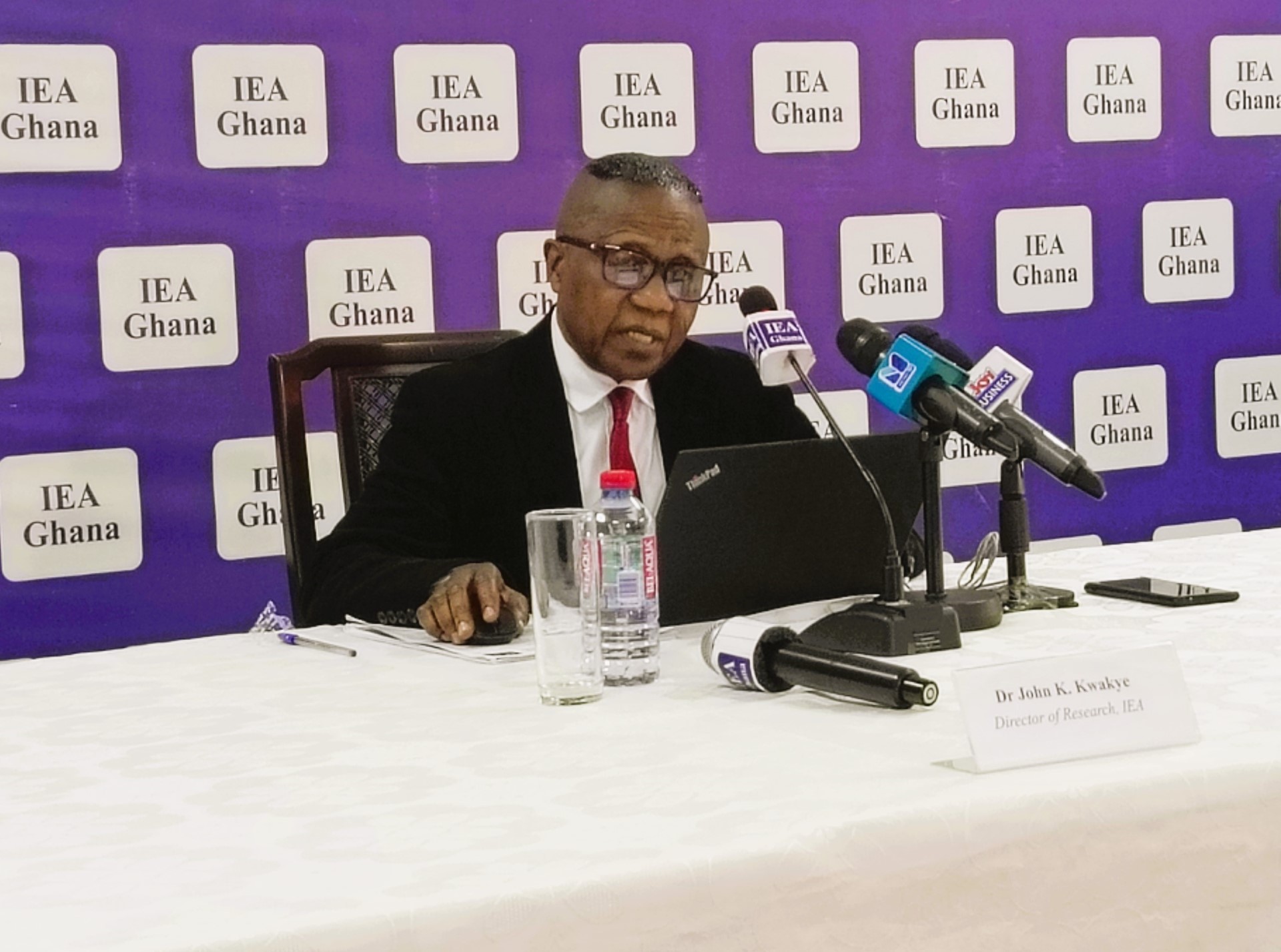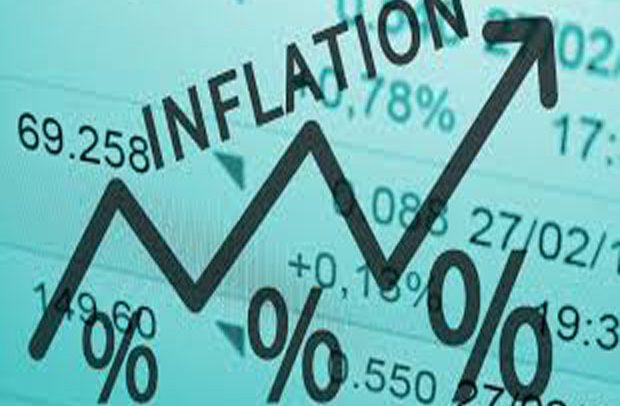
The Director of Research at the Institute of Economic Affairs (IEA), Dr John Kwakye says that the 27% policy rate of the Bank of Ghana does not influence the current inflation fuelled by food prices.
The inflation rate for September has increased to 21.5 per cent from 20.4 recorded in August 2024,
He expressed the view that the central bank will be making a mistake if it sticks to its current tight monetary policy stance.
In a post on his X page, Dr Kwakye said “BoG’s PR has no influence on current inflation that is fuelled by food prices. BoG will be making a mistake if it sticks to its current tight monetary policy stance. The Bank should rather work with Gov’t to reduce food prices.
His comments come at a time when Governor of the Bank of Ghana (BoG), Dr. Ernest Addison, reaffirmed the central bank’s commitment to reducing inflation to single-digit levels, noting that the current inflation outlook is broadly positive.
Speaking at a joint press conference for the 2023-2026 Extended Credit Facility (ECF) Third Review Mission in Accra on October 4, 2024, Dr. Addison highlighted recent trends in inflation.
By the end of the first quarter of 2024, inflation stood at 25.8%, which decreased to 22.8% in the second quarter and further eased to 20.4% by the end of August.
However, the latest figures for the third quarter showed a slight increase to 21.5%, driven by a sharp rise in food prices.
Dr. Addison assured that the BoG will continue to monitor these developments and maintain the necessary monetary policy stance to keep inflation within target over the medium term.
“It is not unusual to see intermittent upticks in inflation. The key is in the trends. The Bank of Ghana will ensure that we stay the course of sound underlying macroeconomic policies.
“In this regard, BoG and MoF will implement an appropriate monetary-fiscal policy mix to deliver sustainable growth in a stable environment,” Dr. Addison stated.
He further said that the central bank is fully committed to bringing inflation back within our single-digit objective and presently, the inflation outlook is broadly supportive and positive.
By the end of the first quarter, he said, inflation was reported at 25.8 percent. This dropped to 22.8 in second quarter and eased further to 20.4 percent at the end of August.
He said that the latest inflation number released on Wednesday for the end of the third quarter saw a marginal uptick in inflation to 21.5 percent on the back of a sharp increase in food prices.
Dr Addison assured that the Bank will continue to monitor these developments and maintain the necessary monetary policy stance to ensure that inflation stays within the target over the medium term.
“Let me note that it is not unusual to see intermittent upticks in inflation. The key is in the trends in the inflation. The Bank of Ghana however, will ensure that we stay the course of the sound underlying macroeconomic policies. In this regard, BoG and MoF will implement an appropriate monetary-fiscal policy mix to deliver sustainable growth in a stable environment,” he said.
The IMF had indicated that Ghana’s economic growth in the first half of 2024 exceeded expectations.
The IMF Mission Chief for Ghana, Mr. Stéphane Roudet, said that Ghana’s performance under the IMF-supported programme has been generally satisfactory.
All end-June 2024 quantitative targets were met, and progress on key structural reforms has continued notwithstanding delays in a few areas, he said.
He further indicated that the authorities’ policy and reform efforts under the programme have continued to deliver encouraging results.
An IMF staff team, led by Mr. Stéphane Roudet held meetings in Accra from September 24 to October 4, 2024, to discuss progress on reforms and the authorities’ policy priorities in the context of the third review of Ghana’s three-year program under the Extended Credit Facility.
The arrangement was approved by the IMF Executive Board for a total amount of SDR 2.242 billion (US$3 billion) on May 17, 2023.
At the end of the mission, Mr. Roudet said in a statement that “The IMF staff and Ghanaian authorities have reached a staff-level agreement on the third review of Ghana’s economic program under the Extended Credit Facility arrangement. This staff-level agreement is subject to IMF Management approval and Executive Board consideration. Upon completion of the Executive Board review, Ghana would have access to SDR 269.1 million (about US$360 million), bringing the total IMF financial support disbursed under the arrangement, since May 2023, to SDR 1,441 million (about US$1,920 million).
“Performance under the IMF-supported program has been generally satisfactory. All end-June 2024 quantitative targets were met, and progress on key structural reforms has continued notwithstanding delays in a few areas. The authorities’ policy and reform efforts under the program have continued to deliver encouraging results.
“Economic growth in the first half of 2024 was much higher than initially envisaged, primarily fueled by mining, construction, and information and communication activity, with a broadening of the sources of growth across sectors during the second quarter. Inflation has continued to decline. The recent dry spell affecting the Northern regions is expected to adversely impact agricultural output, potentially constraining growth and adding pressure on food prices for the remainder of the year. However, the government’s policy response should help mitigate these risks. In addition, the Bank of Ghana is committed to maintaining a tight monetary policy stance to support a continued decline in inflation.
“Fiscal performance in 2024 has so far been strong, and Ghana is on track to achieve a primary surplus on a commitment basis of ½ percent of GDP, despite emerging spending pressures from the recent drought in the northern regions and difficulties in the energy sector. Discussions with authorities centered on reforms to enhance energy sector sustainability and transparency, as well as policies and reforms to strengthen revenue collections and expenditure controls in the run-up to the December elections. We also discussed efforts to strengthen key social protection programs to protect the most vulnerable from the impact of difficult economic circumstances and ongoing policy adjustment.
He further stated that “Ghana has made remarkable progress on its public debt restructuring. After successfully restructuring domestic debt last year and reaching agreement on a Memorandum of Understanding with Ghana’s Official Creditors Committee (OCC) under the G20 Common Framework in June, the government has just announced the successful completion of the consent solicitation to restructure its Eurobonds, with the exchange planned to take place in the coming weeks. The authorities are committed to pursuing good-faith efforts to reach an agreement with other commercial external creditors on a debt treatment consistent with programme parameters and the comparability of treatment principles.
“The external sector has seen considerable improvement in 2024, driven by strong exports—particularly gold and to a lesser extent oil—and higher remittances with international reserves accumulating beyond program targets. Financial stability has been maintained, with progress on recapitalization and increased bank profitability.”
IMF staff met with Finance Minister Adam, Bank of Ghana Governor Addison, and their teams, as well as representatives from various government agencies. The IMF team also engaged with other stakeholders. The IMF staff team would like to express their gratitude to the Ghanaian authorities and other counterparts for their continued open and constructive engagement.
The post Inflation: Work with gov’t to reduce food prices – John Kwakye tells BoG first appeared on 3News.
Read Full Story









Facebook
Twitter
Pinterest
Instagram
Google+
YouTube
LinkedIn
RSS